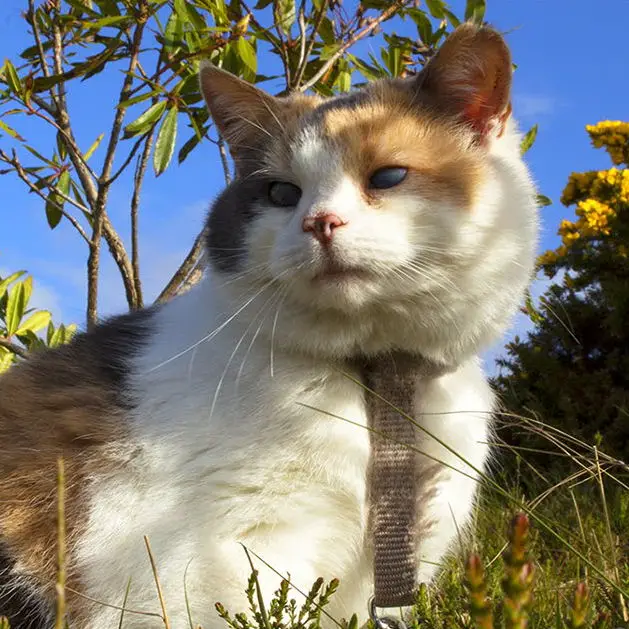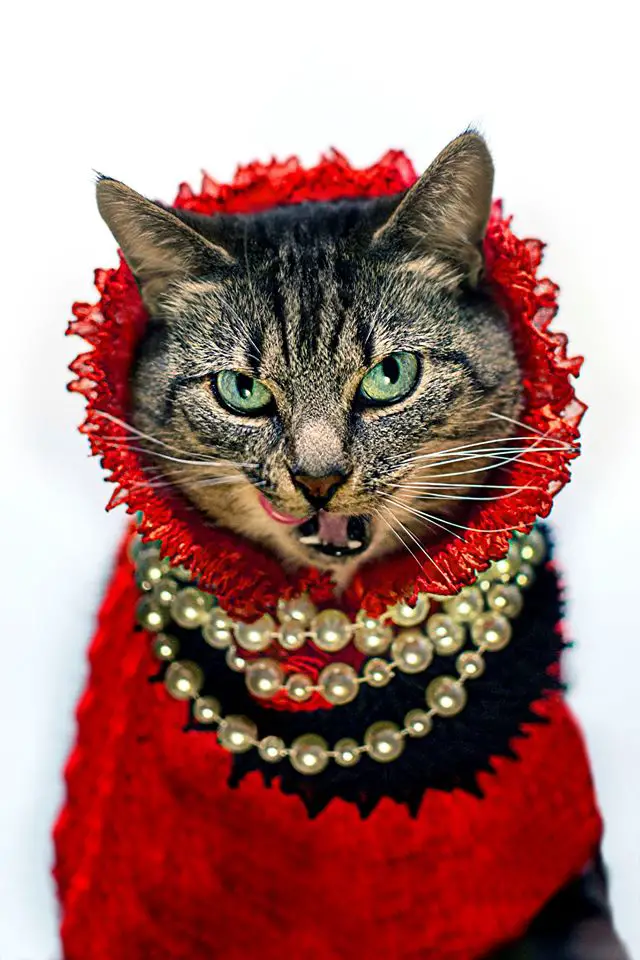We wanted to share an inspiring story from one of our readers who has a beautiful seal point Siamese cat named Bizzy.
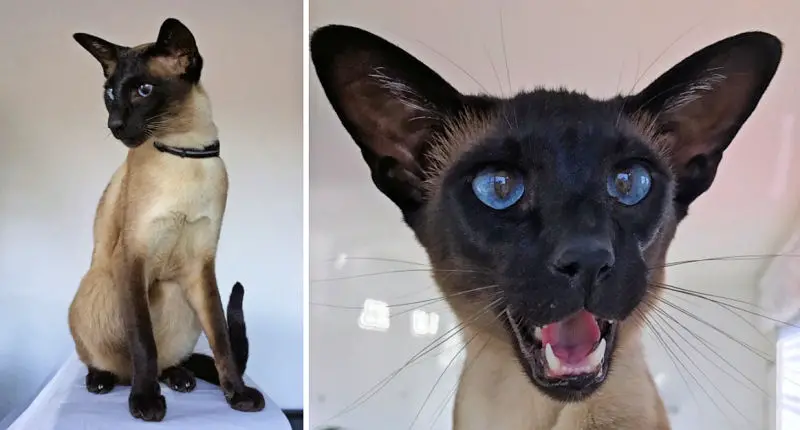
For those unfamiliar with this breed’s origin, the Siamese Cat originated centuries ago in Siam (now Thailand). They are highly inquisitive and very vocal making them a unique and lovable breed. Unfortunately, good eyesight isn’t one of their genetic assets. Siamese kitties are often born slightly cross-eyed, but they are also predisposed to severe vision problems which in some cases lead to blindness.
And that’s what happened to sweet Bizzy who at 2 years of age is now blind from a genetic disorder called PRA (Progressive Retinal Atrophy). Cats with PRA slowly lose their vision as their retinal lens deteriorates. While there is no cure or treatment for it, the atrophy does not show many visible signs and isn’t a painful experience. Affected cats eventually become completely blind.
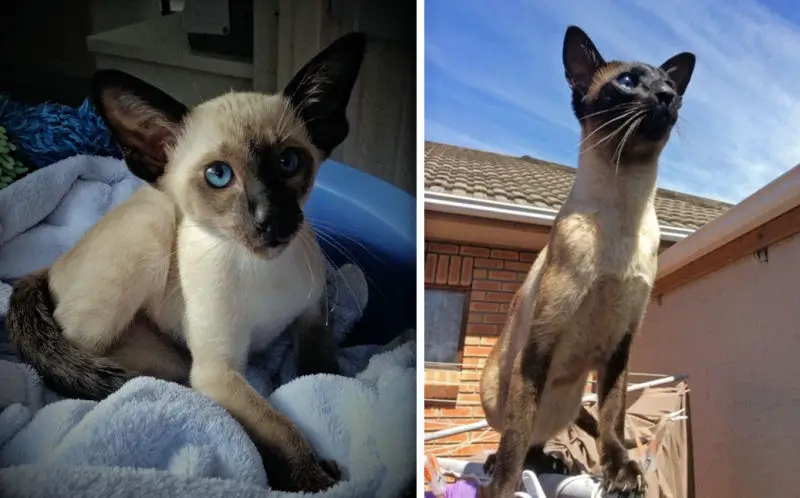
His owner (Lindsay) started an Instagram account @bizzibabs_pra_siamese a few months ago when Bizzy was diagnosed blind. Their eye specialist for cats explained that Bizzy had this hereditary disease of the retina (PRA). His retina, she told Lindsay had turned into little stones. Curious to know more about PRA and wanting to know why their young cat who came to them as a sighted kitten was now totally blind, she searched the web for more information and was surprised to find very little about PRA on the internet. Lindsay stated, “We discovered when asking around about PRA in both cats and dogs, the most common response was and still is is ‘What? PRA? No, I’ve not heard of PRA’. So, I decided to do something about getting the word PRA “out there” – to make PRA a common word with all pet owners and future pet owners. ”
She chose to use Instagram (IG) as her social media platform of choice to spread the message about PRA awareness and with nearly 4,000 followers and growing daily, it certainly seems to be working!
Lindsay goes on to say…”Our purpose on IG is not to fight with breeders who don’t test their breeding cats/dogs to establish if their cat/dog is PRA+ (there are DNA tests available) but to rather educate people to ask questions before deciding to purchase a kitten/puppy. To say – “Am I buying a kitten/puppy that is PRA+ free?” is important because PRA kittens/puppies will, and this is not maybe, will be blind by the age of 5. We didn’t ask, when we bought Bizzy from a Registered SA Siamese breeder and we didn’t ask if Bizzy had PRA+ parents / grandparents or if he was a PRA+ kitten. We didn’t know that PRA existed. This PRA ignorance needs to change both locally and internationally.”
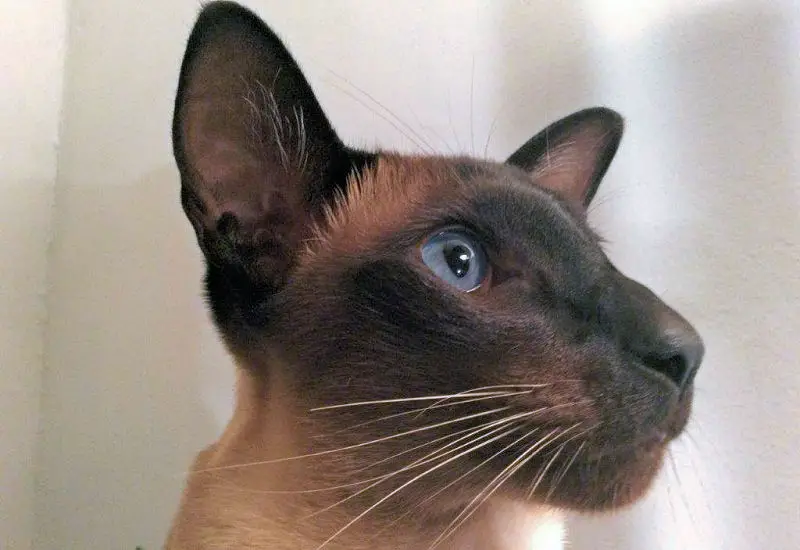
As we usually do, we interviewed Lindsay and here’s what she shared with us:
Q: You obviously got Bizzy as a kitten from a breeder yes?
Yes, Bizzy was 16 weeks old when he came to us as a registered Siamese from a Siamese breeder. He has a certificate boasting a list of Supreme Champions and Champions from his Great Grand Parents, Grand Parents and Parents.
Q: Were there any early signs of PRA? Was Bizzy exhibiting unusual symptoms/behavior?
In his first 20 months Bizzy gave us no reason to be concerned that he was not sighted. He played like all kittens and young cats do.
Q: How soon before you finally had it diagnosed?
On the October 5th, 2015 we took Bizzy to a veterinary ophthalmology specialist. During the appointment we told her that we were concerned because over a 3 month period Bizzy had changed. He was walking into walls and bumping into furniture.
Her report, in writing to us, said : “Visual deficits becoming obvious over the last 3 months. Less confident, not able to jump up onto things as often, bumping into things. Cx negative menac response. Mydriatic pupils but slowly responsive to light. No retinal vessels. Small darkish ONH. Dx PRA – suspected to be inherited. Antioxidants supposed to delay progression but already advanced in Bizzy. Will cope well with blindness.”
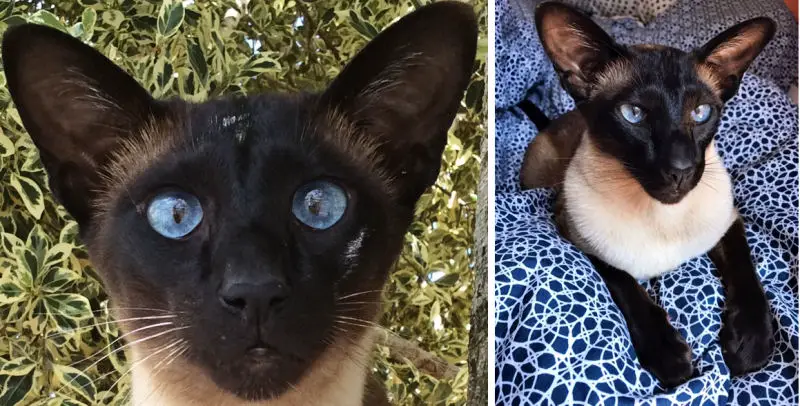
Q: Tell us a bit about Bizzy’s character today.
He has come a long way since October 2015. He walks around the house with loads of confidence – so much so we often forget that he is blind. He knows where the furniture is placed and kitchen counter chairs (his favourite chairs) are and he jumps onto them with ease (but if we move the chair he jumps straight up and falls straight down – that is sad to see because it is a reminder that he is blind). He is loving and enjoys lap time and cuddle time. He purrs loudly and chases the little dog (we have two dogs) – we say he believes he is one of the dogs. He is healthy and smart. He understands the word “no” but always “answers back” when we say No, Bizzy, off the table, or kitchen counter. We never forget that Bizzy doesn’t know the difference between the floor and a table top so we can’t be too hard on him but for his own safety we know he has to understand that there are boundaries and the word “no”.
Q: Is Bizzy still busy?
He used to be busy – he went through climbing the curtains stage (until one day the curtains were open and he jumped straight into the glass, thankfully he did not hurt himself) he has settled down and he is very much like a sighted adult … he believes he needs lots of sleep … so no, at this age, he is not that busy. He has freedom to roam inside and outside the house. He has an enclosed, small back garden that is escape proof. Some mornings/afternoons he spends his day sleeping in the sun inside or outside the house. He has outdoor plants and herbs for stimulating smells and cat grass to chew and small bugs (he catches them) to hunt/eat.
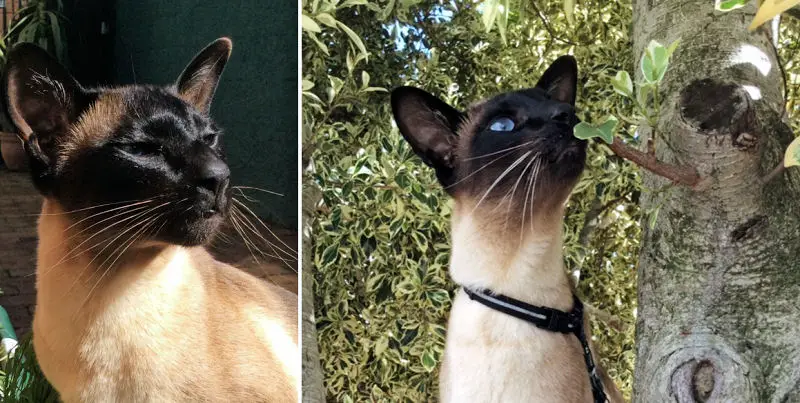
Q: How has PRA changed his/your life?
For his own safety Bizzy only has access inside the house and out at the back to play in the enclosed back garden – but this was/is not enough to keep him happy especially when he hears his two dog “brothers” getting ready for their daily walk. He would “shout” at us wanting to know why he can’t also go outside in the front with his brothers. He thinks he is one of them. So, we slowly got him used to wearing his harness and leash and then we slowly got him used to going for a daily neighbourhood walk. He loves his walks. When the harness goes on (after I ring a little bell that is there beside the harness) he comes running to us wanting his harness on and wanting his walk time.
Keeping Bizzy safe is a big one and a constant worry because he climbs up onto things but often he is to afraid to climb down. We have come to recognise his “help me” meow is different from other meows. Obviously we cant always be home and so we are not sure if the “help me” meow is just to keep us on our toes (how smart) because we have not yet come home to find Bizzy stuck ! Anyway, because he is very loved – we will always come running when he shouts for help.
A second reason why Bizzy is not allowed in the front of the house without wearing a harness and leash – he will, if he gets out, be off into the neighbourhood and he will never find his way back – we believed that for a long time. So to help him find his way home, if he ever gets out front, accidents do happen, we have trained him, always wearing a harness and leash, during training, to go for little walks (also helps to help keep his mind stimulated) up and down the road in the front of his house. Its amazing how we can see between now and when he first started his walks that he now knows where he is during these walks and which way is home and where – this is amazing- the front gate is to come back inside and the front door. He always rubs himself against the gate and front door before he enters the house. We also noticed that when he walks he wants to walk close to fences, garage doors, walls etc – feeling his way home with his whiskers and most probably he feels safer between me and fence, wall etc. Best of all, these days he is very pushy that he has his daily neighbourhood walk. Great because it keeps his mind stimulated and me walking fit. If we pretend we have forgotten about his walk, usually happens late afternoon, he bangs against the closed front door and shouts at us in his loudest voice – “Its my harnie time”.
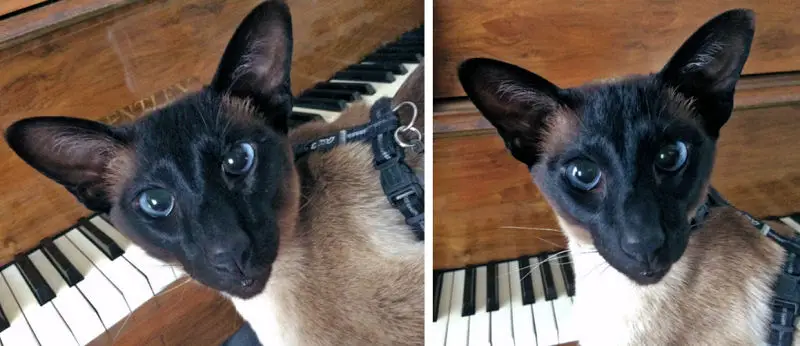
There are other smaller but important things. A standard size litter tray was suddenly too small for Bizzy so we bought him the biggest plastic container we could find and now he aims just fine.
Bizzy also moved into his own “bedroom” (the laundry room) for night time sleeping. We introduced this to him slowly because having free roam of the house at night, Bizzy getting “stuck” ended up shouting through the night and no one got any sleep. He has grown so attached to his own room he often goes there to catnap during the day (its a sunny, large room) and by 9.30 pm he takes himself to his room for bedtime sleeping. How he knows its night time sleep time is amazing. At night, when we close the door of his room, it has in it everything in there that he needs until morning – his bed and blankets, water fountain, a scratch post, toys, always a night time treat and dry food to snack on until the morning. (Because Bizzy is blind he never wakes up first – he only starts his “Good Morning” meows “Let me Out for real breakfast” when he hears his dog brothers are up and about and we are walking around.)
His preference of toys changed. Before he was blind all toys were fun. Now, its only catnip mice or toys with sound.
Q: What would you recommend anyone planning on getting a Siamese/Oriental to do before adopting/buying?
There is no reason why a blind cat cant be a happy cat and if a PRA+ kitten / cat becomes part of your home then so it is but if we all start asking breeders if the breeding cats are PRA free then surely there will be less PRA kittens / puppies born into the world.
[clickToTweet tweet=”A brave young Siamese cat learns to cope with blindness brought on by a genetic disorder called PRA” quote=”A brave young Siamese cat learns to cope with blindness brought on by a genetic disorder called PRA”]
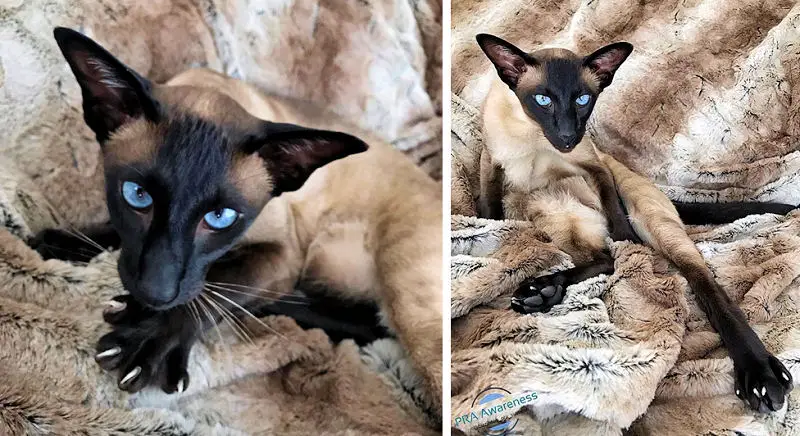
Summary
According to Dr. Ruth MacPete, DVM who has had personal experience with PRA in two of her own cats, she suggested the following:
Diagnosis of progressive retinal atrophy
If it looks like your cat is having trouble seeing, you should take her to the veterinarianCat’s eyes as soon as possible. Your veterinarian can usually diagnose PRA based on the appearance of your cat’s retina. Electroretinography or genetic testing may be ordered to confirm the diagnosis.
Treatment of progressive retinal atrophy
Unfortunately, there is no treatment for PRA due to a genetic mutation. However, scientists have identified 2 of the genes that cause PRA in cats, allowing breeders of predisposed breeds to check their breeding stock with these genetic tests. For fluoroquinolone-associated PRA, it is important to discontinue the antibiotic as soon as possible to avoid additional damage to the retina. With taurine-deficiency PRA, correcting the nutritional deficiency promptly stops the progression.
Living with progressive retinal atrophy
It’s important for people to understand that cats can adjust remarkably well to living with PRA. Unlike people, cats don’t need to drive or read and they spend most of their time in one place. As a result, cats become familiar with the layout of their house and can get around easily by memory. However, there are 2 things you need to know if you are living with a blind cat:
- Try not to rearrange furniture
- Keep blind cats away from pools and balconies without barriers
Dr. MacPete stated, “Most people who met my cats didn’t even realize they were blind and were amazed to see them maneuver around my house and even jump onto the furniture.”
Please help Bizzy spread the word by following him on IG at @bizzibabs_pra_siamese and feel free to drop us a comment on any experience you may have had with feline PRA or caring for a blind cat. >^..^<
~~~~~

